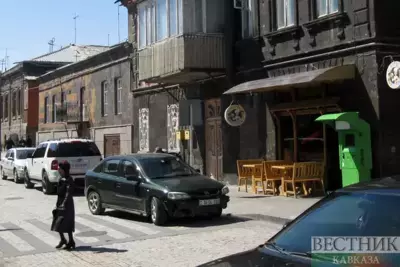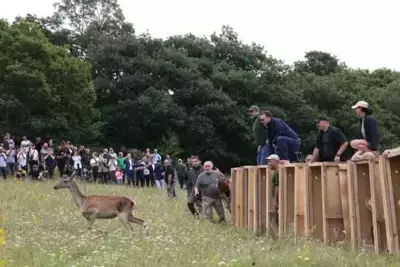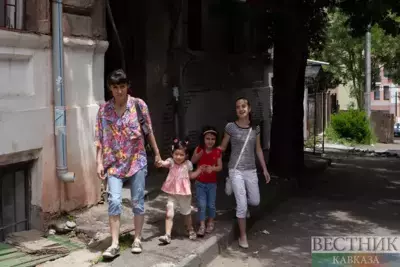Last week, Terter hosted the opening of the settlement for IDPs from the occupied Azerbaijani territories. The ambassadors of several countries and foreign journalists accredited to work in Azerbaijan participated in the ceremony. Vestnik Kavkaza spoke about how today Azerbaijan conducts the work in the sphere of social security for refugees and IDPs, as well as on the prospects for the Nagorno-Karabakh conflict’s settlement with the official representative of the Azerbaijani Foreign Ministry, Hikmet Hajiyev.
- Over the past 16 years, Azerbaijan has built 97 settlements for internally displaced persons. How will the state continue to work in this direction? Is it possible to say that this way the country not only protects its citizens, who suffered from the war but also wants to show its possibilities to conflicting Armenia and other states?
- Yes, that's right. These infrastructural projects in the sphere of the work with internally displaced persons show that citizens of the country are at the center the Azerbaijani state’s policy. Solving social problems of the least protected part of our society - refugees and internally displaced persons - is a priority of this policy. To accomplish this task, 97 settlements have been built up to the present day, including the newest one in the Terter region. Along with the improving the social security of our citizens, it also shows the will of the Azerbaijani state and people to build the similar modern settlements in the territories liberated from the occupation. A typical example of this is a work accomplished in the village of Jojug Merjanli, released after the April 2016 battles. Speaking of the new settlement, it is located on the territory that was occupied by the Armenian Armed Forces. After the liberation of these lands, Azerbaijan decided to build a modern settlement with all the social infrastructure for internally displaced persons.
- Azerbaijan has repeatedly stated that it is ready to restore completely the destroyed occupied areas at its own expense after their liberation. In your opinion, is an example of Jojug Merjanli village an incentive for the OSCE Minsk Group, which convinces the mediators of Baku's constructive approach to the Nagorno-Karabakh settlement?
- The post-conflict rehabilitation process, which involved Jojug Merjanli, is unique. This is a part of the so-called ‘Great Return’ plan, prepared with the participation of the international institutions, in particular, the World Bank. There are several important aspects here. First, it is required to ensure the safety of the population for its return. Azerbaijan had cleared all the territory around the village from the mines, after this, people were able to return to their homes. The second, it is necessary to create an infrastructure. In Jojug Merjanli, absolutely all necessary infrastructure up to the modern roads has been built. The third, each resident has received his plot of land, the conditions have been created to provide people with work. All the post-conflict period elements have been realized in Jojug Merjanli, and this is an example for the whole world, which, we hope, will stimulate the co-chairs of the OSCE Minsk Group in their work to resolve the conflict. At the same time, it is a message to the Armenian community of Karabakh, that Azerbaijan is ready to create all the conditions to carry out the restoration work absolutely for all citizens after Armenia’s occupation is ceased.
- Today, you can often hear that the model of Azerbaijan's work with refugees is an example. What can Azerbaijan offer to other countries facing the same problem?
- Azerbaijan's model of work with internally displaced persons and refugees is a model for many countries. This is recognized, in particular, by the Office of the United Nations High Commissioner for Refugees. We try to share this experience, and the state will continue to improve the social security of refugees. At the same time, refugees and forced migrants have one desire - to return to their homes and regain their once-lost property. The purpose of the Azerbaijani state, along with the social security of refugees, is to return them to their native lands and arrange the safe, dignified and peaceful life for them.
- What can stimulate the transition from diplomatic meetings to the implementation of the concrete steps, such as the liberation of the occupied areas around Karabakh and the return of refugees?
- First of all, Armenia should take the first step by demonstrating the political will, since the entire responsibility for the created situation lies with the Republic of Armenia occupying the territory of Azerbaijan. Today, you can see the positive echoes of the negotiation process - it has become intensive and substantive. Earlier, the Armenian side tried to avoid specifics, not to talk about the main essence of the conflict, put technical issues on the agenda. And today, there is a concrete content of the talks, the purpose of which is to change the status quo, the basis of which is the fact of the Azerbaijani territories occupation. First and foremost, it is necessary to put an end to the very fact of the occupation. In this regard, there are four resolutions of the UN Security Council, according to them, Armenia is obliged to withdraw its troops from the occupied territories. Today, Armenia does not want to do this, striving to keep the lands under the occupation as long as possible, avoiding the requirements of changing the status quo. In this case, the OSCE Minsk Group is obliged to press Armenia to achieve the main goal - the withdrawal of the troops from the territories of Azerbaijan.
- How dangerous is a delay and postponement of the talks? Is there a threat of the active hostilities resumption?
- The probability of resuming the active hostilities always exists, until Armenia withdraws its troops from the occupied Azerbaijani territories. You may consider, that today we have a ‘World War II’ scenario, when the trenches are dug through the entire front line, and the armed soldiers stand face to face. But it is unacceptable for Europe after the World War II to have a situation, when the tensions do not decrease, and the probability of incidents remains constantly high. The presence of the Armenian military forces on the territory of Azerbaijan is a direct threat to the regional stability, and first and foremost, we must put an end to the military risk, which is based on the fact of occupation. The decisions of the 1994 OSCE Brussels Summit mention that Armenia must withdraw its troops and thereby end the military risk by embarking on a political path to resolve the conflict in accordance with the aforementioned resolutions of the UN Security Council. However, while the occupation of the Azerbaijani territories continues, the political solution of the conflict is not possible.
- How do you assess the role of Russia in the settlement of the conflict? What trends will be decisive in the Russian-Azerbaijani relations during the next year?
- The Russian-Azerbaijani relations are developing in the spirit of the strategic partnership, and Baku values them greatly. I would like to underline the positive political dialogue between the leaders of the two countries, which always gives a good impetus to the strengthening of the relations between the countries at all levels. As for Russia's position as a mediator in the settlement of the conflict, we believe that the unsolved problem concerns Russia, as it is one of the Caucasus countries bordering the South Caucasus states. In this regard, Russia is making efforts to settle the conflict. To increase the effectiveness of its actions, there is a certain potential, and the same can be said about the other co-chairing countries of the OSCE Minsk Group - members of the UN Security Council - that are capable of making every effort to resolve the conflict. Azerbaijan is ready to work intensively with all the mediating countries participating in the conflict settlement.
- The conflict significantly changed the picture of the South Caucasus. Azerbaijan continues to implement the successful global projects, and Armenia has been left with nothing. In your opinion, how will the settlement of the conflict affect the relations between the countries?
- As a result of the conflict, Armenia has isolated itself. It remains outside of the regional projects. Azerbaijan, meanwhile, encourages not only the regional cooperation, but the large-scale projects at the interregional level. The transport corridors between the East and the West, the North and the South, as well as the numerous hydrocarbon projects, are the examples of this initiatives. If Armenia wants to take part in these projects, first of all, it must cease the occupation of the Azerbaijani lands. The Armenian people will benefit the most from this. We hope the Armenian leadership will finally understand that this is the reality. Azerbaijan is always ready for the regional integration and cooperation, but Armenia must abandon the occupation policy that it has been conducting all these years.
















